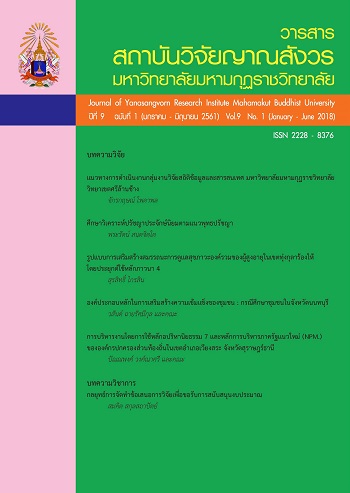Strategies of the Research Proposal Setting for the Budget Supporting
Main Article Content
Abstract
The research proposal setting for the budget supporting is the key procedure of getting the research budget for the efficiency and effectiveness research that achieves the research proposal objectives. The academic field receives benefits according to the researcher’s intention. The research proposal setting is the research planning as the directed blue-print that specified of the systematic research which using both science and art. The importance of the research proposal setting is consisted of the key topics that are the researcher has the clear research study guideline, can determine the key components of the research proposal relevantly and control the error of research study. It is also used as the handbook for conducting the research, following up and assessing the research study and submitting for the budget. Furthermore, the researcher must consider of the key components of the research proposal that comprises of the proposal title, the significance and background of the research problem, the research objectives, the research questions/ the research issues, the review of related literature, the theoretical framework/conceptual framework, the research hypotheses, the scope of research, the constitutive definitions, the expected benefits of research, the research methodology, the research operational plan, the research budget and the researcher’s/researchers’ resume. The strategies of the proposal setting are as follow: S.1 Determining of the research question issues with high impact, interesting and challenge to search for reply. S.2 Determining of the research title that inform the research question issues. S.3 Reflection of the significance, problem and necessary to research. S.4 Indication of the researcher’s intention. S.5 Using theory based for the research question issues that need reply. S.6 Integration of idea/theory and the related research according to the research issues. S.7 Defining the theoretical/conceptual research framework using principle/theory/innovation/ research based. S.8 Forcasting of the variables’ relation effect. S.9 Determining of the research scope clearly. S.10 Using the related literature based for the constitutive definitions. S.11 Specifying of the significance/ academic value and the applying body of knowledge/innovation/research results. S.12 Design of the clear, suitable research methodology. S.13 Defining the clear and possible research operational plan. S.14 Specifying of the possible and necessary research budget according to the expenditure. S.15 Showing the potential of the researcher/ the researcher team. S.16 Basic self assessment of the research proposal for improvement according to the quality criterias that concerns with completeness, clarity, reasonableness, consistency, relevance, appropriateness, worthiness, feasibility and utilization.
Article Details
References
สุชาติ ประสิทธิ์รัฐสินธุ์.(2546)ระเบียบวิธีการวิจัยทางสังคมศาสตร์.พิมพ์ครั้งที่ 12,กรุงเทพฯ: ห้างหุ้นส่วนจำกัดสามลดา
อุทุมพร (ทองอุไทย)จามรมาน.(2545)การเขียนโครงการวิจัย.พิมพ์ครั้งที่3,กรุงเทพฯ:ฟันนี่พับบลิชชิง.
Ackoff, R. L. (1953). The design of social research. Chicago: The University of Chicago Press.
Babbie, E. (1986). The practice of social research. (4th ed.). Belmont, CA: Wadsworth Publishing.
Baker, T. L. (1994). Doing social research (2nd ed.). Singapore: McGraw-Hill, Inc.
Best, J. W. and Kahn, J. V. (2003). Research in Education. 9th ed. Boston: Allyn and Bacon.
Borg,W.R. & Gall,M.D.(1989). Educational Research: An Introduction, (5th ed.). New York : McGraw-Hill.
Creswell, John W. (1994).Research Design: Qualitative & Quantitative Approaches,.USA.: Sage Plublication, Inc.
Festinger and Daniel Katz. (1953).Research Methods in Behavioral Sciences.(5thed.). New York : Deyden Press.
Hilway,Turus.(1964).Introduction to Research.Boston : Houghton Mifflin.
Miller D.C. (1991).Handbook of Research Design and Social Measurement. (5thed.). New Lury Park,CA: Sage.
Neurman.W.L. (1991). Social Research Methods : Qualitative and Quantitative Approaches. Boston: Allyn & Bacon.
Travers, Robert M.W.(1969)An Introduction to Educational Research. The Macmillan Company.
Wiersma, W. and Jurs, S. G.(2005). Research Methods in Education: An Introduction. 8thed. Boston: Pearson Allyn and Bacon.


